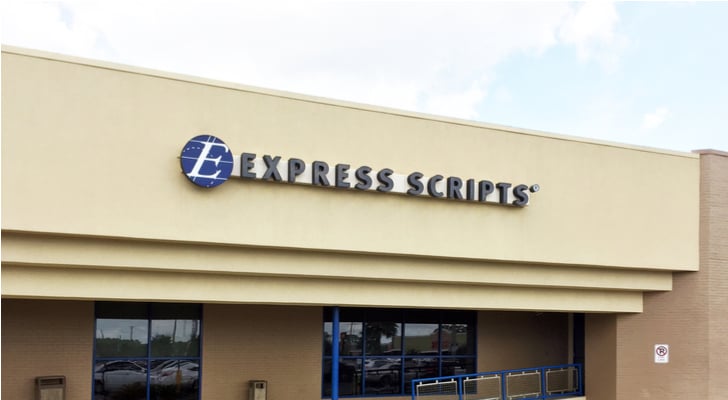A recent article at Axios.com regarding Express Scripts Holding Company (NASDAQ:ESRX), a pharmaceutical benefits manager (PBM), exemplifies why one must be careful about what one reads. The article is riddled with inaccuracies that might steer investors away from PBMs – companies that do both people and investors a lot of good. Express Scripts stock should be evaluated on its merits.
You can read the article here if you want.
PBM’s negotiate on behalf of large groups of employers to streamline the entire process, and leverage the buying power of these large entities to negotiate lower drug prices for sponsored health plans. PBMs save pharma companies from having to negotiate with thousands of individual employers.
By bringing in customers in bulk, pharma companies can significantly lower the price of drugs. Employers and their employees are satisfied because the PBM is able to negotiate these discounts.
PBM’s generate revenues via 1) beneficiary co-pays, 2) management fees paid by the health plan, and 3) rebates, incentives, and performance payments paid by the pharma provider.
Contracts and Express Scripts Stock
Yet the Axios article seem determined to paint ESRX and PBMs in a bad light. They rely an outdated contract template, rather than a bonafide contract and extract some very strange and inaccurate conclusions from it.
Right off the bat, the author says that the contract’s “language is clearly written with the PBM’s financial interests in mind…”
It darn well better be!
Any company has a fiduciary responsibility to its shareholders. It would be an illegal contract if the interests of Express Scripts stock was not in mind. Does Axios think other companies are somehow exempt from the same interests it puts forth itself in its 5,000 word privacy and terms of use policy?
The concerned parties would not enter into any contract unless all were satisfied with its terms. That’s why it’s all contracts are preceded by a thing called “negotiations.”
In regards to these contracts, the article makes another bizarre statement: “These PBMs have entire departments of lawyers where this is their game.” I think this is meant to suggest that PBMs to take advantage of clients because their lawyers have some kind of magical powers.
Except employers, health plans, and health insurance companies also have armies of lawyers, not to mention ERISA analysts, benefit advisors, procurement departments, and HR pros to represent their own interests. If all these experts believed the PBM contract was a bad deal, the employer and health plan could walk away and negotiate with another. There is no monopoly on PBMs.
Rebates and Express Scripts Stock
Axios criticizes rebates without understanding how they work, falsely claiming that ESRX negotiates rebates on its own behalf and for its own benefit, and not on behalf of the sponsor
Cue the broken record: If the deal was bad, there would be no contract. What employer wants to charge employees more than they need to pay for drugs?
Let’s also remember that the PBM has to make some money from these employer deals to even stay in business, and rebates are only a piece of the revenue pie. As it is, most PBMs pass on 90% of manufacturer rebates, and PBMs only end up with $2 out of every $100 spent.
Axios seems to want to gut the already-miniscule 2% share that ESRX and other PBMs need to stay in business.
Understanding The MAC List
Axios is also critical of something called the MAC List, and fails to understand what it is and how it works.
The claim is that Express Scripts stock benefits from the company using an opaque “proprietary algorithm to determine whether a drug is brand or generic…so it can pocket the difference between a brand-drug discount and a generic-drug discount…[charging] employer clients $15 for a particular medication but pay the pharmacy just $1 for the same medication…and keep the extra money for itself.”
ESRX does not do any such thing.
The proprietary MAC pricing method prevents competing health and pharmacies from know each others’ MAC rebate calculations. If they did, it could result in price fixing, and push drug prices higher.
MAC pricing is also necessary because pharma manufacturers charge different fees for interchangeable generics. Prices are influenced by how many companies make a generic, how widely available certain generics are, manufacturing issues, and competition.
Also, PBMs and pharmacies make larger profits on some drugs but take losses on others because market prices are dynamic.
Claims About Express Scripts
Axios is sloppy with its claims. Why didn’t the author read the NIH study which concluded that, “expansion of existing MAC programs and creation of new ones could contribute to cost containment efforts nationwide.”
What about the study out of the University of Illinois? It concluded that there were multiple unintended and harmful consequences by restricting MAC programs, including increased costs; administrative complexity, higher costs, and unpredictability; and that requiring public disclosure of MAC methodologies is likely to lead to tacit collusion and higher prices.
Bottom line: do your due diligence. If you read an article like this, be suspicious. Follow up. There’s no reason to be scared into or out of an investment when you read nonsense.
Disclosure: None

